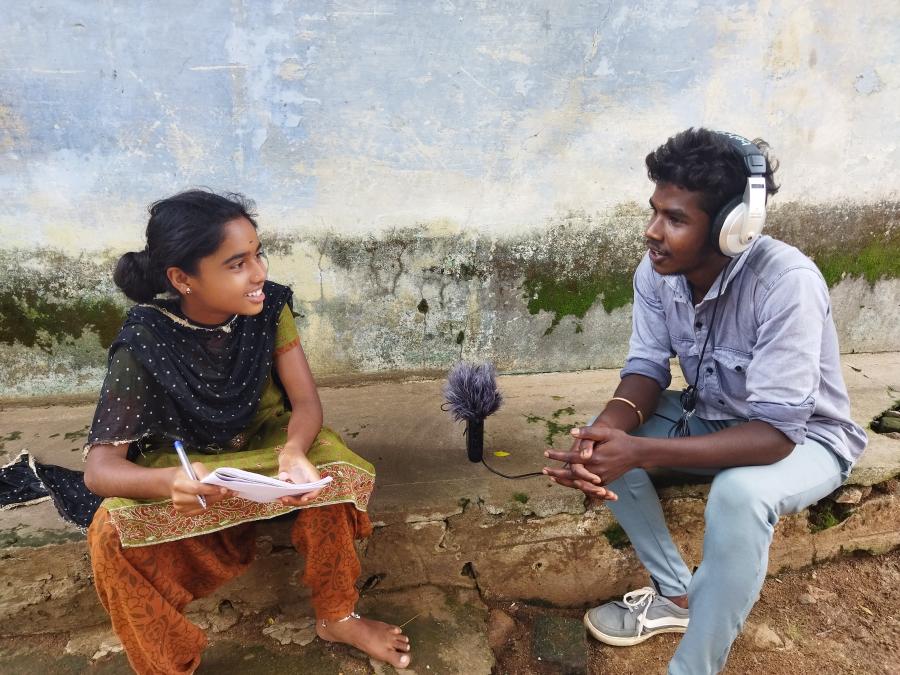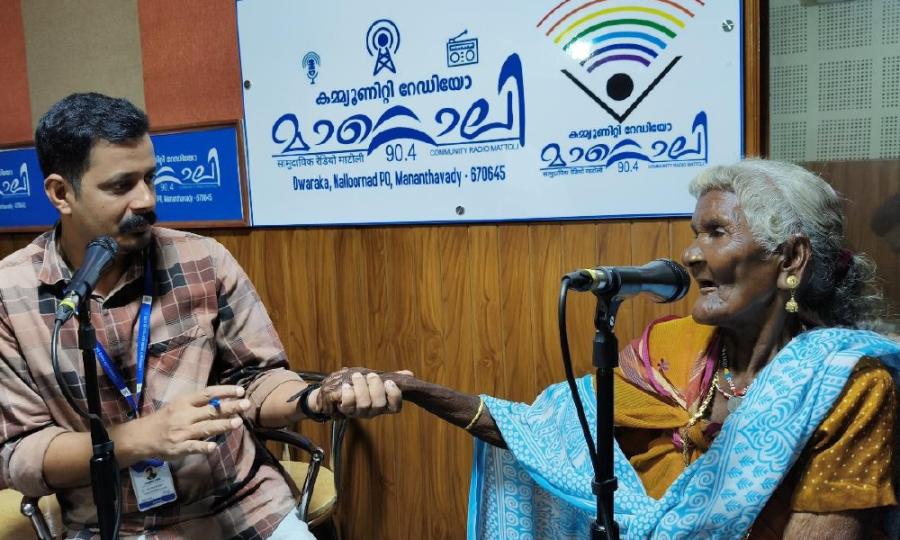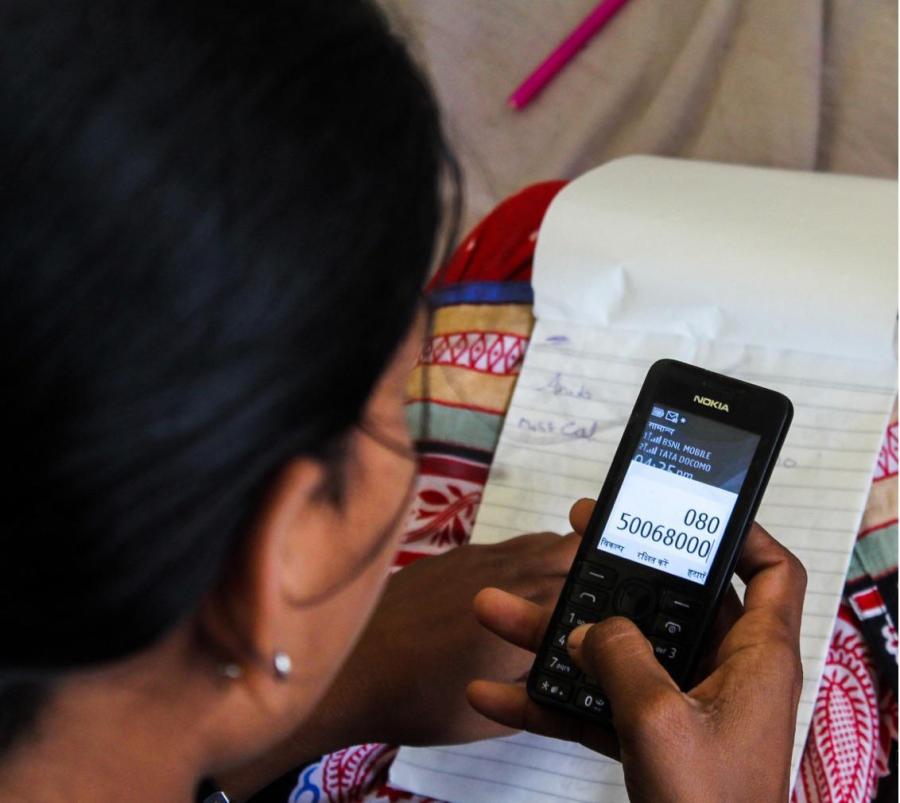Of India's vast population, 90 million belong to the indigenous communities known as adivasis or tribals. Most of the tribal communities live in central India; some live in the northeastern parts of India. Both areas are rich in timber and minerals. Tribals have developed sophisticated knowledge systems related to the folklore, ecology, agriculture, healthcare, art forms, and craft styles of their regions. Due to the developmental policies India followed during the last 50 years, the forest in the tribal belt is left devastated. State-sponsored forestation has favored monacultural forests and agricultural policies that leave little room for biodiversity and indigenous agriculture. Today, neither biodiversity nor human diversity in the form of the languages and dialects spoken by tribals is recognized. The varied cultures of the tribal communities are threatened by the rapid migration of tribal people to urban industrial centers.
In order to bring about a significant shift in the social, economic, and cultural conditions of India's tribals, a long-term strategy is required that will value and recognize the principles that have evolved along with their indigenous history and culture.
The Bhasha Research and Publication Center was established in 1996 as a voluntary organization for the study, conservation, and promotion of tribal languages, literature, history, culture, arts, and crafts. It is also concerned with the socio-economic welfare of tribals and protection of their human rights. Bhasha, the Sanskrit word for speech, stands not only for language, but also for the voice of the indigenous and marginalized communities. Bhasha's work is mostly conducted in the western tribal belt of Maharashtra, Madhya Pradesh, Gujarat, and Rajasthan. It also extends to other regions, primarily through its activities among migrating communities, especially the denotified and nomadic tribes.
Bhasha's goals are to discover, publish, and promote the linguistic, literary, and artistic heritage of tribal communities in India; to collaborate with existing national academies and research institutes of arts and literature to encourage further research and publication at the national level; and to establish an academy of formal instruction for the promotion of tribal languages, literature, arts, and culture with a view to conserving the tribal imagination.
In the last few years, Bhasha has created a nationwide network of experts engaged in the study of tribal languages, literature, and arts. Its work combines academic research with all phases of tribal development -- from art to economics -- and concentrates on the following projects.
Publication
Of the numerous languages in India, only a limited number are recognized and promoted by the eighth schedule of the Indian constitution. About 80 tribal languages are not recognized in the educational system or the literary tradition of the country, mainly because they do not have distinct scripts and are transmitted orally. In order to save these languages from extinction and to preserve their vast cultural and literary treasures, Bhasha publishes a magazine called Dhol in 11 tribal languages (Ahirani, Dungri Bhili, Panchamahali Bhili, Kunkna, Dehvali, Rathawi, Bhantu, Choudhri, Gor-Banjara, Pawri, and Marathi). The editor of each issue is a folklorist/compiler of oral literature in his or her respective community. Dhol has emerged as a platform on which tribal intellectuals can share their cultural knowledge and practices with the other tribals of India. The magazine reaches about 2,000 village readers in each language. Bhasha also recently began to publish books in these tribal languages.
To make this project possible, Bhasha created a new convention, which has been adopted by India's National Academy of Literature (the Sahitya Akademi), for the written transcription of tribal languages. The Sahitya Akademi recently awarded Bhasha the honor of producing 40 volumes of literature in tribal languages.
In addition to Dhol, Bhasha publishes the magazine Budhan, a newsletter for the denotitled and nomadic communities of India.
Four issues of the newsletter are published every year, and report on the social and cultural conditions of denotified communities, their legal status and rights, and the difficulties they face. Budhah has helped the group form a network of activists, lawyers, legal advisors, thinkers, and researchers who are now making conscious efforts to study, analyze, and act with these communities. Regional versions of Budhah in languages like Marathi, Bengali, Hindi, and Gujarati are planned.
Tribal Artists Cooperative
The tribal communities are skillful in crafts and have their own particular styles using local and environmentally friendly material. Bhasha organized a three-month workshop in 1998 for 300 artists. They produced sculptures, paintings, beadwork, canework, pottery, and textiles. To encourage their craft styles through sales in the national market, Bhasha acquired the work, giving birth to the Artists Cooperative Society. The members of the Cooperative benefit from Bhasha's national exposure to sell their work while retaining 100 percent of the profits.
Micro-credit Scheme
In order to create a supplementary source of income for the tribals, Bhasha initiated a poverty alleviation program in the form of a micro-credit scheme. In association with the State Bank of India, Tejgadh, and the Punjab National Bank, Baroda, this scheme will enable tribals to develop a sense of saving surplus income and realizing a profit from its investment. The scheme aims to empower tribal savers and borrowers through the concept of self-reliance, freeing them from indebtedness to exploitative money lenders. Since July 1999, we have established 100 self-help groups in 40 tribal villages. More than 1,200 individuals, many of whom are artists, benefit from the program. After a regular cycle of savings, individuals receive small loans -- used primarily for agriculture and entrepreneurship in traditional skills of arts and craft -- at the standard rate of interest. Income generated through agriculture and arts is thus converted into productive capital holding.
Tribal Academy
Bhasha has established a tribal academy at Tejgadh, a tribal village 90 kilometers from Vadodara. The academy currently hosts 15 students registered for the post-graduate diploma in tribal studies program. The curriculum includes tribal folklore, languages, history, economy, law and human rights, culture, arts, and crafts. Students are trained in developmental economics so that they can take up the work of social reconstruction and economic empowerment in tribal areas. The academy also conducts courses to enhance special tribal skills in arts and crafts, entrepreneurship, diversification of occupations, modernization of agriculture, and forest development. The institution aims to create a community of scholars and activists with a pan-Indian vision of tribal transformation to give tribal studies and tribal activism in India a new direction and a sense of social purpose. No examination is conducted at the end of the teaching program; evaluation is based on individual performance.
Other Projects
Bhasha also runs: a computer training center for the tribal students of Tejgadh, in which basic and advanced courses are taught; a library in Ahmedabad for the denotified tribes; a mobile library that operates in 25 villages of Chhota Udepur district; and Prakriti Health-Care, a mobile health care unit in the tribal villages of Gujarat that organizes health care camps in the most interior villages. In addition to these programs, Bhasha has instituted an annual lecture series in memory of Verrier Elwin -- remembered as the most influential advocate of tribal culture in India -- to which we invite a large number of tribal intellectuals from various states. Each year, an archery competition is organized to bridge the gap between the police department and the tribals and to promote amity.
Bhasha is not aligned with any political party, and does not advocate a political ideology. Our primary interest is to study, record, and promote the tribal civilization of India before it disintegrates altogether. Our work is done with very little governmental support.
Article copyright Cultural Survival, Inc.



